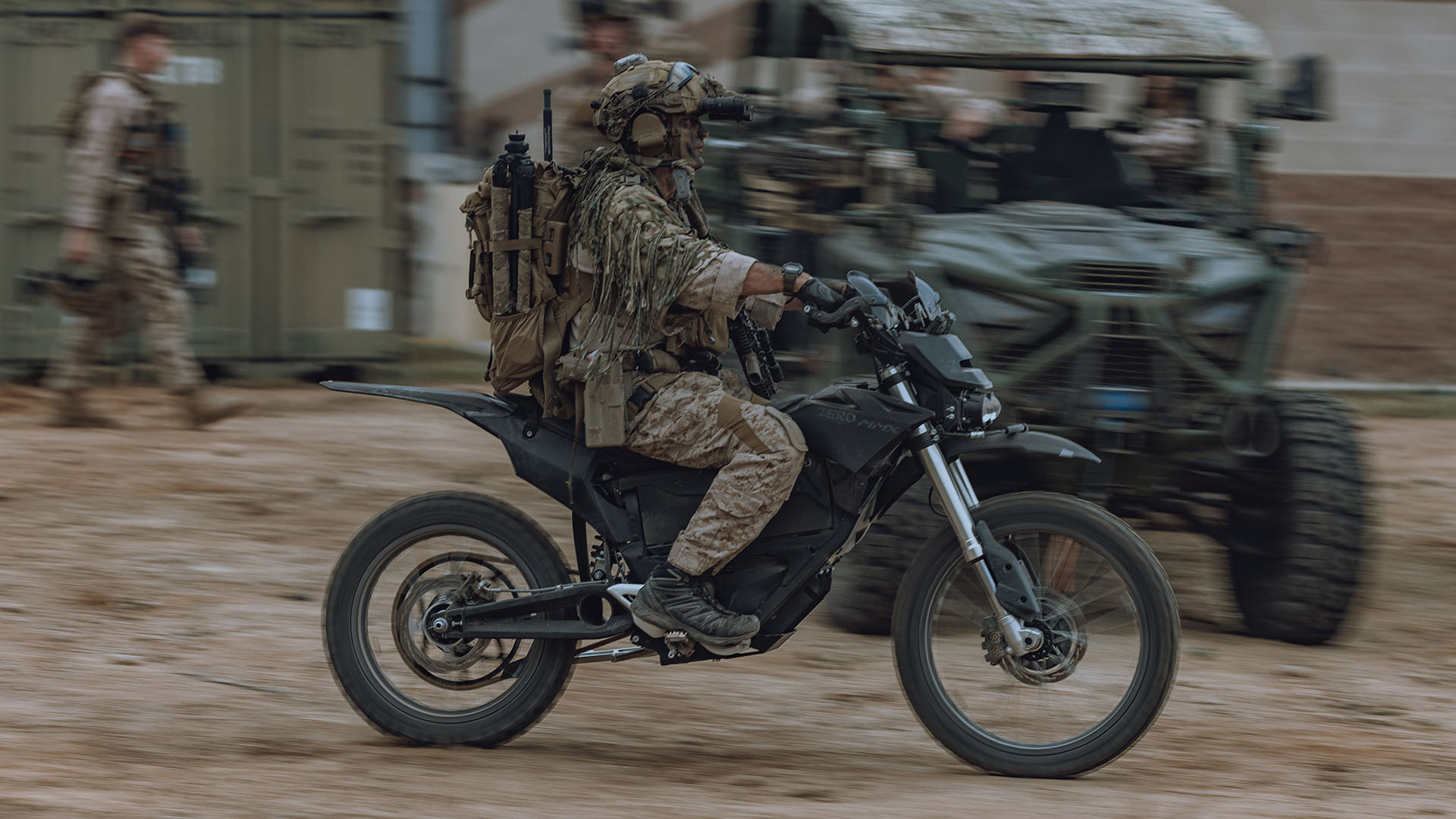

A company of Recon Marines will have a new addition to their military kit when it deploys next year: Zero MMX electric dirt bikes.
All the Marines in Bravo Company, 1st Reconnaissance Battalion have been testing the electric motorcycles, said Capt. Jonathan Bender, Bravo Company commander.
“As we look ahead to potential conflicts in the Pacific, large vehicles, like JLTVs [Joint Light Tactical Vehicles] and 7-tons [trucks], are not going to be able to maneuver as intended in dense jungle environments,” Bender told Task & Purpose. “The dirt bikes provide access to areas that might otherwise be untenable for those platforms.”
The electric motorcycles are also quieter and have a smaller heat signature than other vehicles, making them harder for a peer threat to detect, Bender said.
Stealth is essential for Recon Marines, who are tasked with both amphibious and ground reconnaissance missions. After going through the rigorous 12-week Basic Reconnaissance Course, Recon Marines then receive advanced training from several schools including the United States Marine Corps Combatant Diver Course. In total, Recon Marines go through up to two years of training as part of the selection and training process.
Subscribe to Task & Purpose Today. Get the latest military news and culture in your inbox daily.
USNI News first reported that Recon Marines in Bravo Company were learning how to use the dirt bikes ahead of its deployment next year as part of the 15th Marine Expeditionary Unit.
The 15th MEU is currently conducting pre-deployment training, said 1st Lt. Sean Waterman, a spokesman for I Marine Expeditionary Force. Marine Corps officials will announce later what the unit’s areas of operation will be.
Bravo Company could use the electric dirt bikes in conjunction with its other vehicles, Bender said.

“The bikes can be utilized as a screening force, an early warning for a larger convoy, and to gain access into a position of advantage for overwatch,” Bender said. “We have also validated that the bikes can be inserted via JPADS (Joint Precision Aerial Delivery System), which can be jumped alongside our jump teams for use on the deck.”
Because the motorcycles are electric, they are easier to maintain than other vehicles, and also significantly increase the distance that Recon Marines can cover when it is dark out, Bender said.
MacGyver Solutions Inc, the sole military distributor for Zero Electric Motorcycles, has delivered several electric motorycles to the 1st Reconnaissance Battalion since 2021, said Mike Jackson, the company’s founder and president.
Jackson said he has also sold electric motorcycles to U.S. Special Operations Command units. He declined to provide any specific information, citing operational security.
Each dirt bike is equipped with two batteries, weighing about 40 pounds each, that give the motorcycles a range of between 50 and 100 miles before needing to be recharged, Jackson told Task & Purpose.
The motorcycles are also easy for novices to learn how to use because they don’t have a clutch, and they always start so long as they have a battery, he said.
“Gas bikes leak gas when laid down, carbs flood, plugs foul, all kinds of mechanical risk of failure to start,” Jackson said.
Hollywood was the first to realize dirt bikes could be a major force multiplier for U.S. military operations. In the 1986 movie The Delta Force, Chuck Norris rides a dirt bike equipped with rockets that allow him to not only take out terrorists but also drive through the main villain’s home and deliver a roundhouse kick before dispatching the tango.
In real life, it is not advised that U.S. troops drive a motorcycle through the window of a terrorist’s lair without wearing personal protective equipment, including eye protection and a helmet. Roundhouse kicks are, of course, always welcome.
The latest on Task & Purpose
- Marines investigating video in which man claims body buried at Camp Lejeune
- The best MRE of the War on Terror, according to combat veterans
- 19 US troops have Traumatic Brain Injury after drone attacks in Iraq and Syria
- US expects Iran to continue to escalate Israel/Hamas war
- Fort Liberty special operations soldiers arrested for drug possession